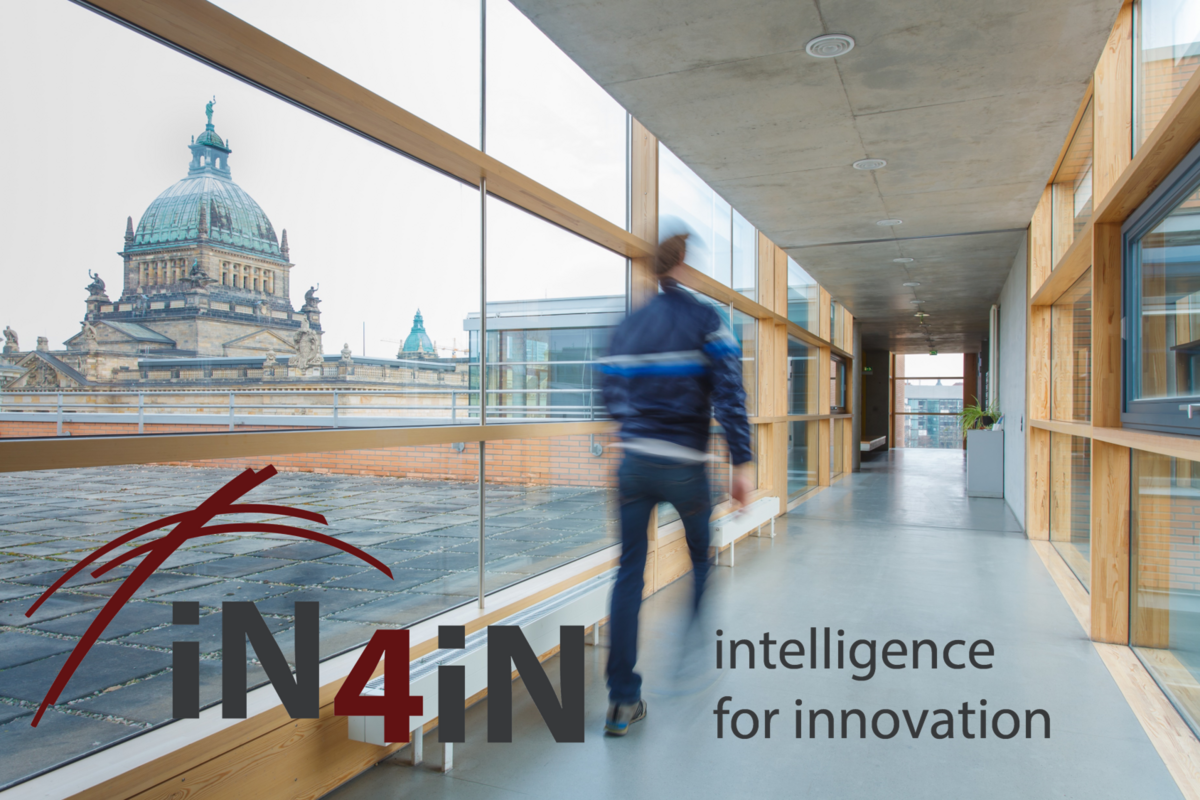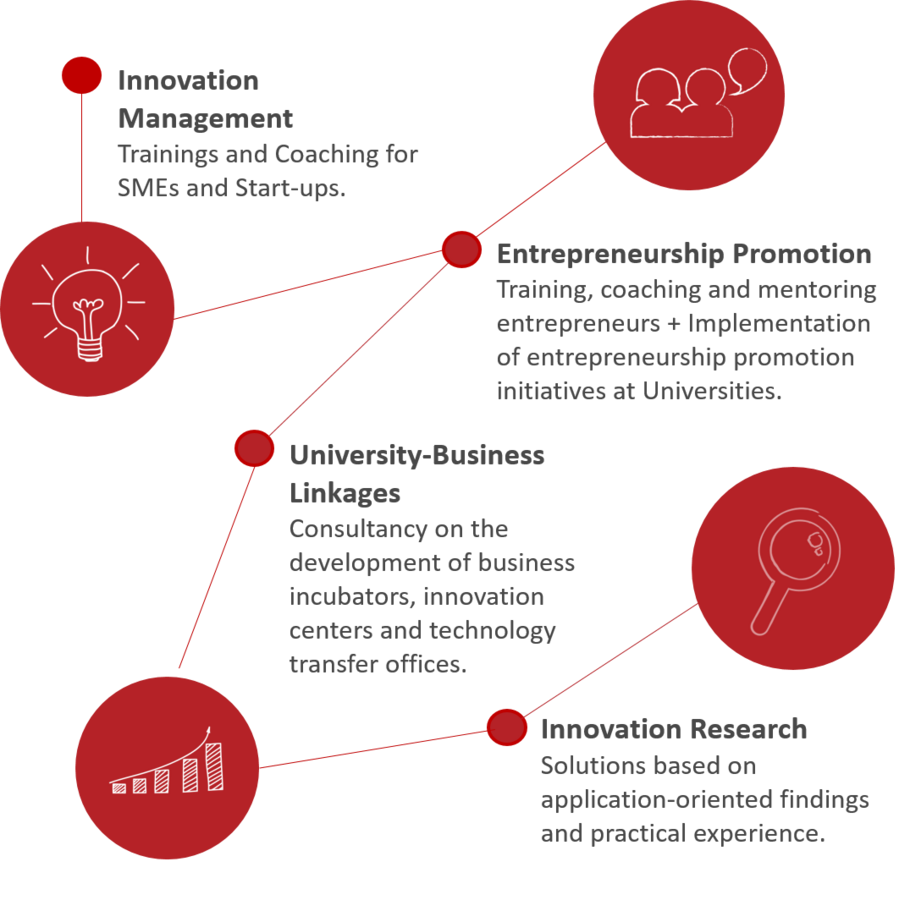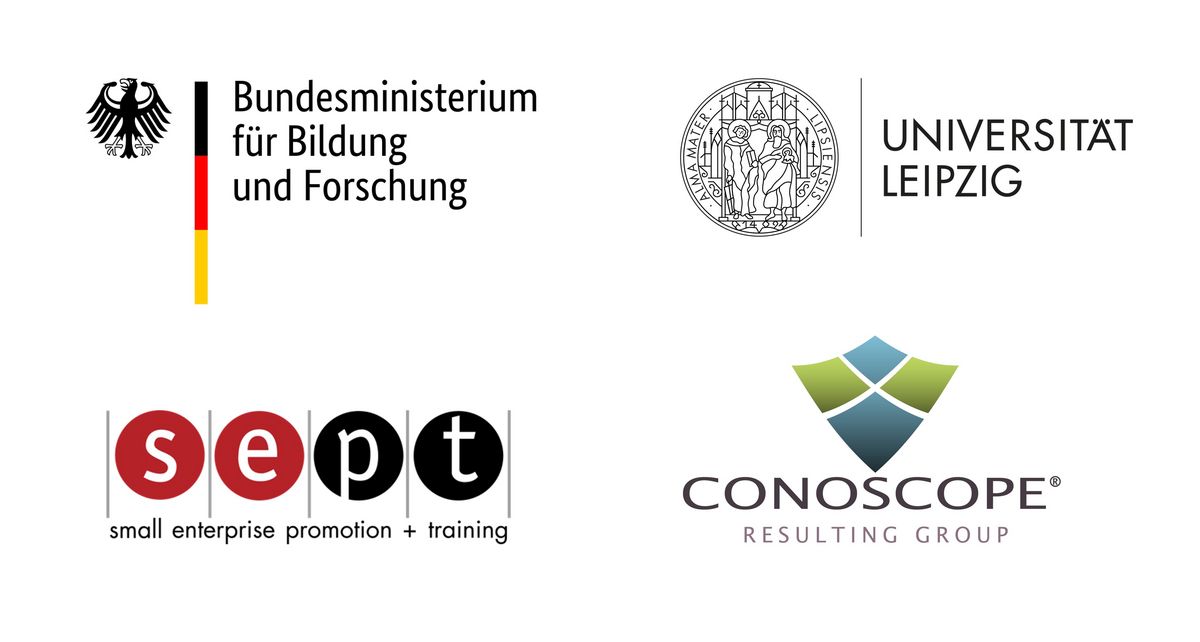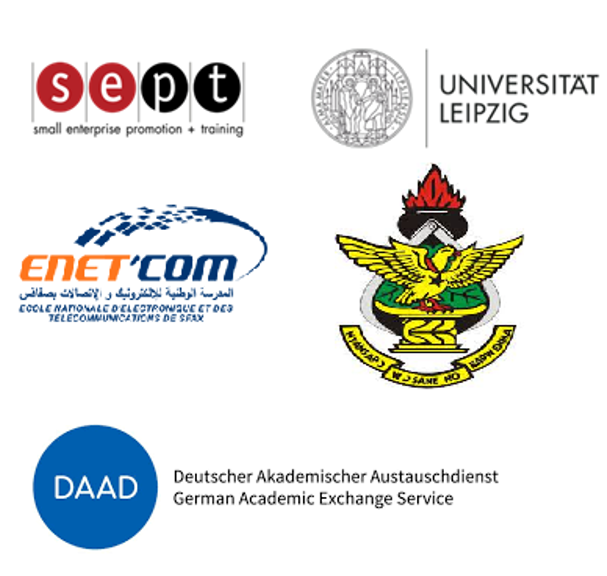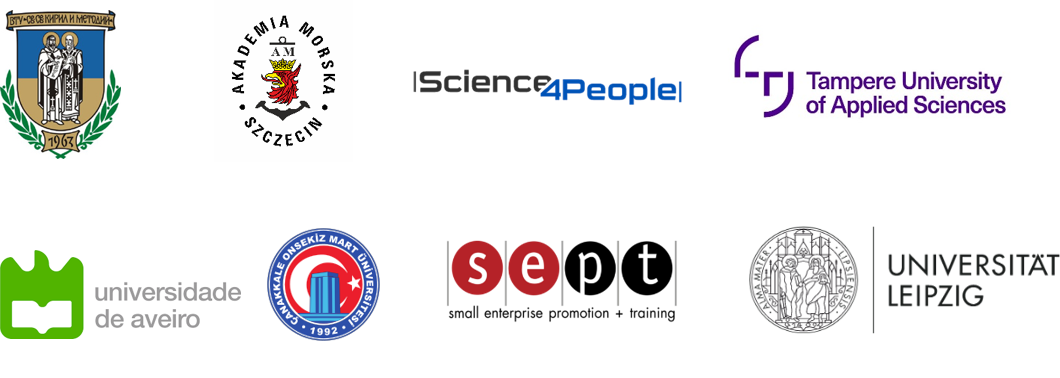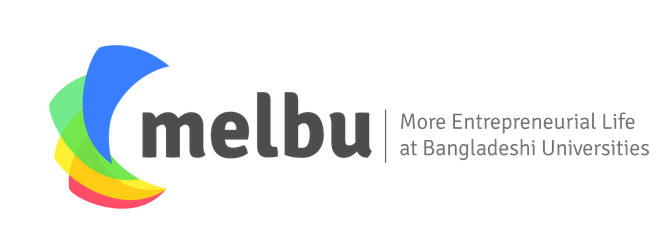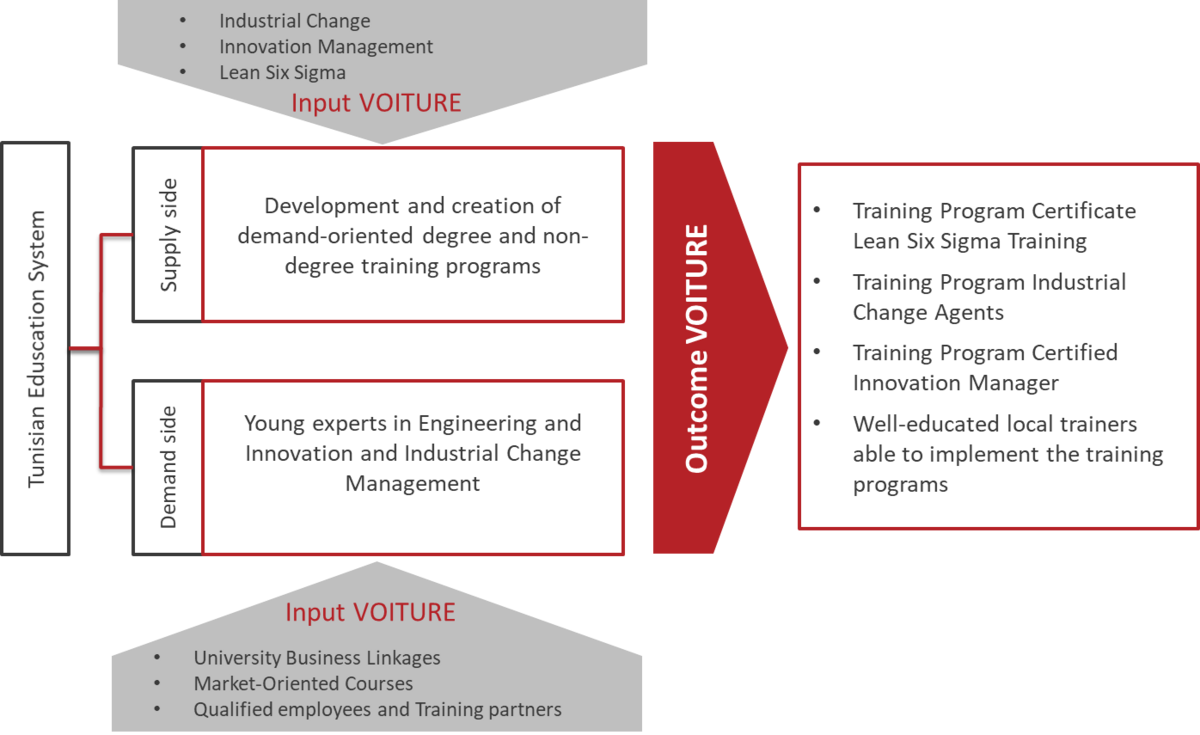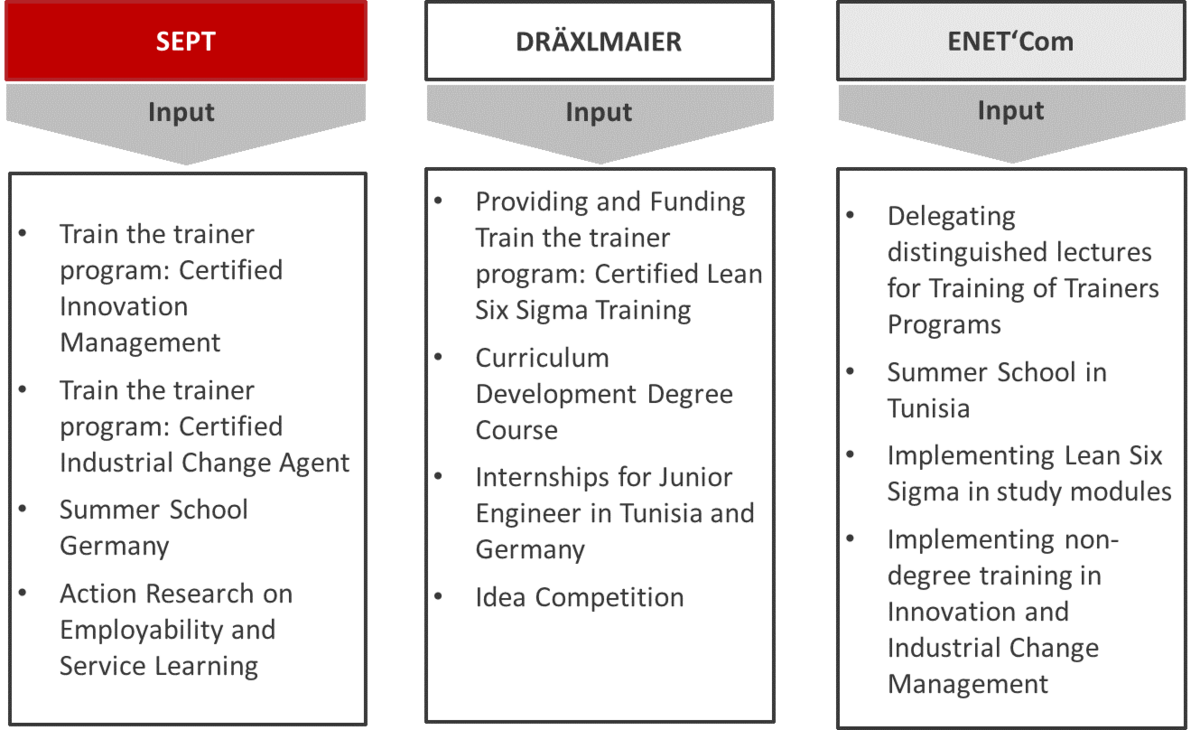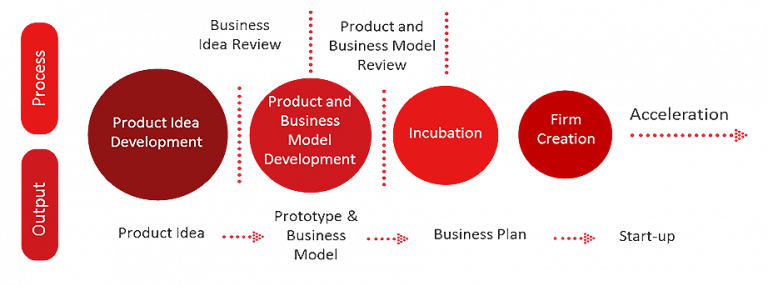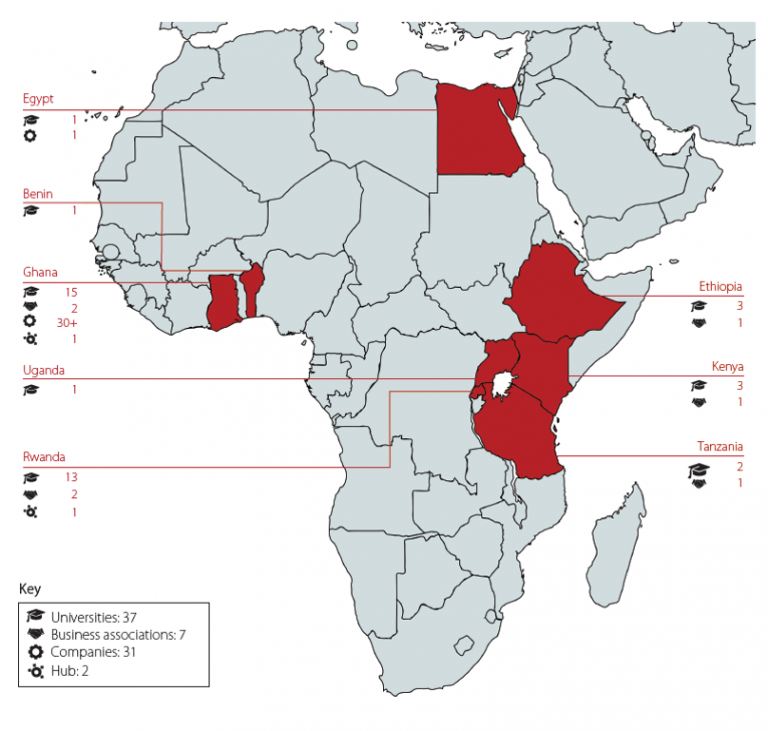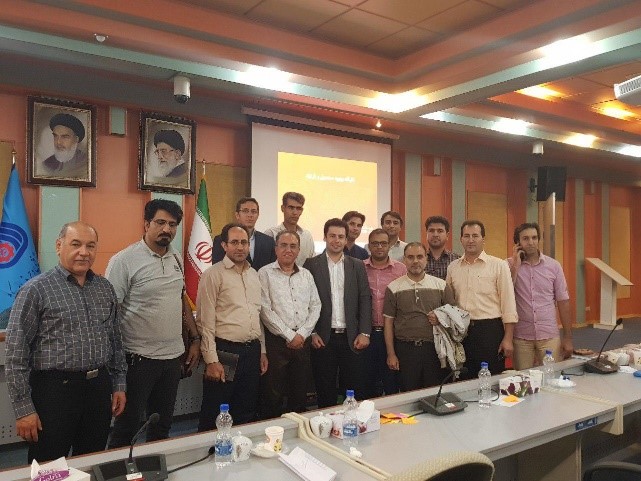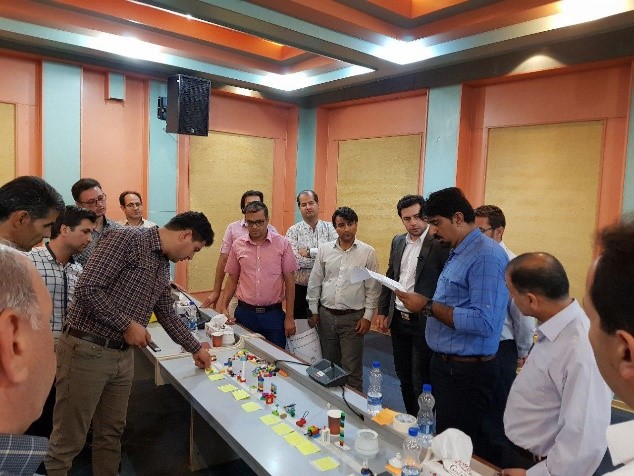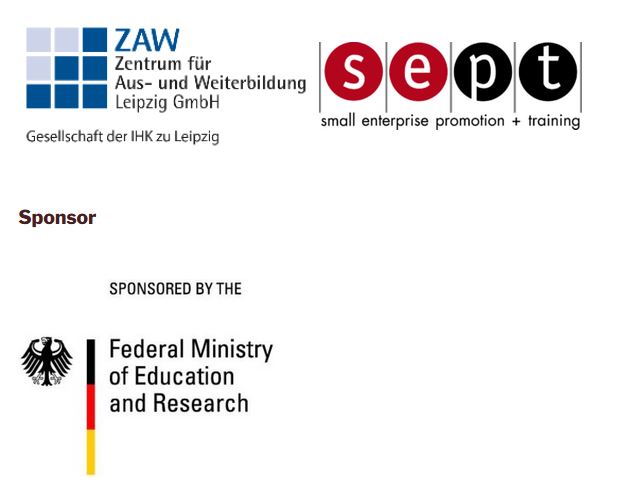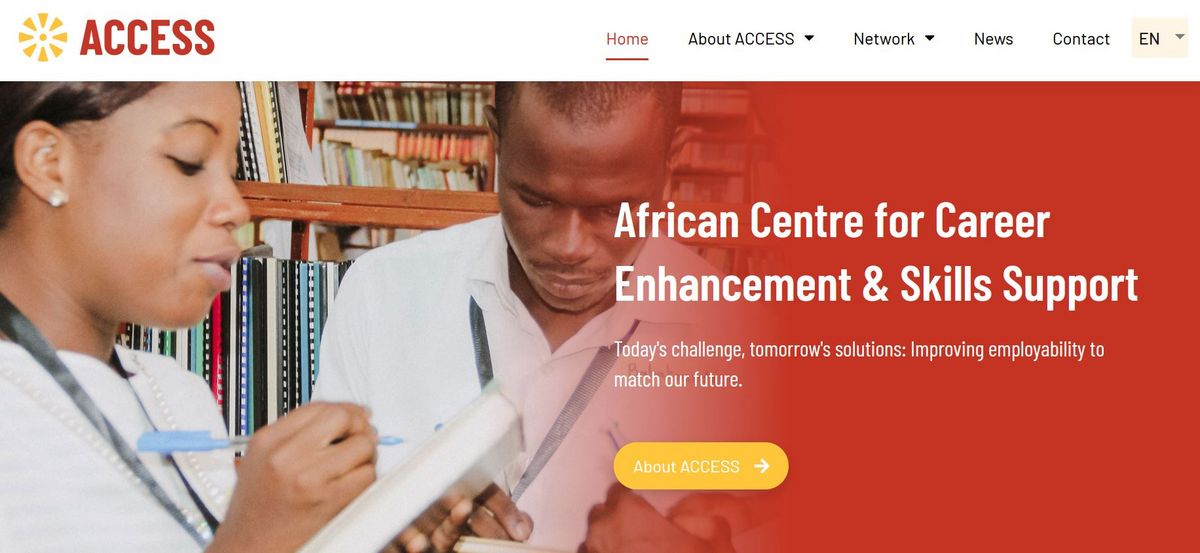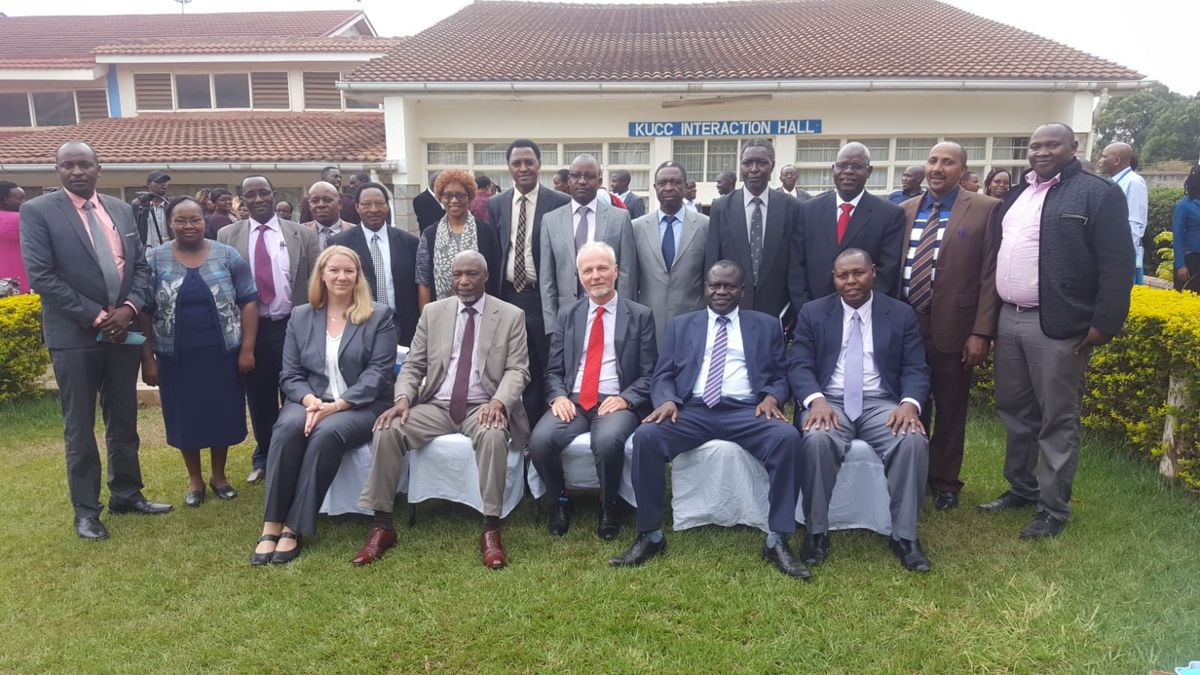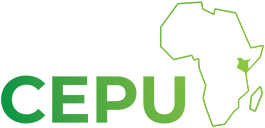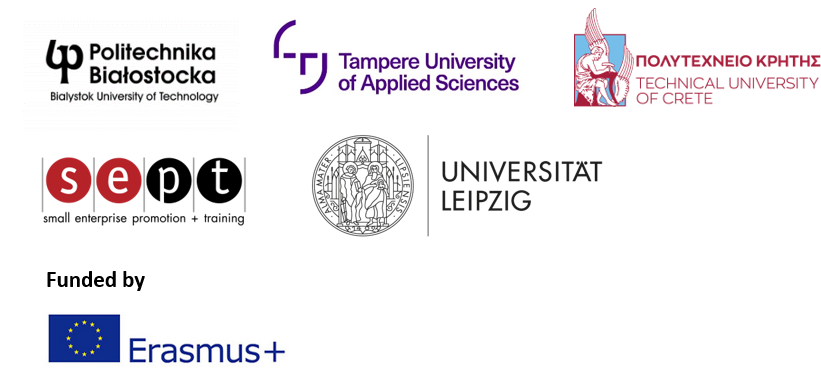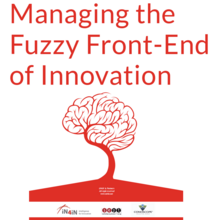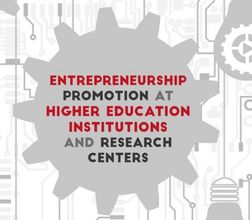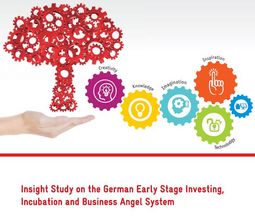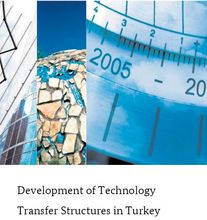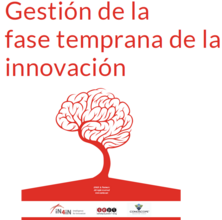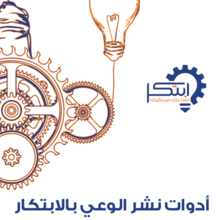iN4iN Intelligence For Innovation is a network developed by the International SEPT Competence Center of Leipzig University for the promotion and development of innovation and entrepreneurship capacities of SMEs, start-ups, universities, professionals and other valuable stakeholders.
About
The base of the iN4iN Intelligence For Innovation network, developed by the SEPT Competence Center of Leipzig University and Conoscope GmbH, a consulting company in Leipzig, Germany, is the conviction that the future of our economies relies on innovative Small and Medium-sized Enterprises (SMEs). For this reason, we have developed our iN4iN approach dedicated to conveying theoretical knowledge, application-oriented findings and practice-relevant experience with regard to the management and promotion of innovation in SMEs.
iN4iN aims to offer a pragmatic set of strategies and instruments to be used by SMEs capturing important aspects for stimulating the innovation culture and strengthening the competitiveness of the enterprise. Furthermore, we are convinced that universities play a very important role in the creation and the growth of innovative SMEs. Therefore, with our iN4iN approach, we especially invite higher education institutions to cooperate with us in stimulating an effective environment for the growth of innovative SMEs.
Focus
We enhance your Innovation Management Capabilities
Innovation has become an important topic in business management, due to its vital role in creating a competitive advantage for organizations, institutions, and professionals. Although the concept of innovation is usually affiliated to terms like idea and invention, few know how to systematically promote and introduce new ideas than can be transformed into beneficial products and/or services. At iN4iN, we know that in order to truly create value, the innovation process must be able to strategically respond to both internal and external opportunities, inside a market-driven management framework.
Based on our extensive international experience, we have developed a strategic approach for our customers to acquire the necessary set of skills and instruments to properly manage the innovation process inside their organization. We especially support SMEs and larger companies in implementing an effective Innovation Management System. Please also contact us, if you plan to prepare your company for ISO 56000 certification in Innovation Management.
From Idea to Acceleration: Developing your Entrepreneurship Promotion Concept
We offer entrepreneurs and academic institutions worldwide, a transfer of our entrepreneurship promotion concept in cooperation with the SMILE Start-up Initive at Leipzig University, a well-known regional project that supports entrepreneurship and start-ups in our region.
SMILE has a vast experience in the supervision and coaching of start-ups and spin-off companies as well as in the training of soft skills and management competencies. Every semester around 1.000 participants take part in the program, and as a direct result, almost 560 businesses have been founded.
We guide our partners in setting-up the right concepts and tools for supporting idea generation, and moving forward to the corresponding prototyping and business model development, together with its corresponding review, incubation, and business creation, before leading to the best part: acceleration.
Connecting Universities and Businesses for Development
We consider Higher Education Institutions as important players in local economic development. They should appropriate measures to a) foster regional economic development through cooperation with the private sector, b) promote knowledge and technology transfer to existing players of the economy and c) facilitate the cooperation of the university with all actors in the society. Accordingly, all Higher Education Institutions are hereby directed to reorganize and strengthen the University Business Linkages (UBL).
The recommended focal areas for the development of University Business Linkages in universities are as follows.
- Developing practice and business oriented student‘s projects
- Organizing trainings and coaching activities for businesses
- Implementing (technical) consulting services for businesses
- Implementing an IP policy at universities
- Promoting the creation of University Spin-offs
- Promoting research cooperation between businesses and the university
- Promoting strategic alliances with the private sector in order to develop the research” infrastructures and capacities at universities
The aim of every knowledge transfer process is the successful transfer of knowledge from a knowledge source to a knowledge recipient. Success is indicated by the creation of the ability within the recipient to contextualize knowledge, and to then use this knowledge to initiate concrete, local and sustainable innovation processes. While today’s new technological solutions wield the potential to trigger global economic development processes, knowledge transfer processes are often insufficiently professionalized to enable developing and emerging economies to make full use of this potential. From this standpoint, we approach the transfer processes of knowledge and technology-intensive solutions focusing in particular to SMEs as knowledge recipients.
Activities
At iN4iN we want to make the resources and international experiences of the SEPT Competence Center accessible to SMEs, start-ups, universities, professionals and other valuable stakeholders.
Projects
Here you can learn more about our international projects in the areas of promotion and development of innovation, entrepreneurship capacities and University Business Linkages.
About
The E-FARMER 4.0 project is based on an initiative of four alumni organizers from the SEPT Alumni Community who have taken a strong role in the project development. By involving the alumni organizers throughout the implementation as part of the project activities and encouraging them to pay attention to just transition concepts and feminist approaches to development, the project contributes to the active implementation of these concepts in small scale activities and enables multiplication.
Project goals
Agriculture plays a strategic role at the heart of the globalized world's main problems, as it affects not only food security, but also natural resources, energy, poverty, population and migration. Moreover, agriculture’s vulnerability to climate change raises serious uncertainties about the survival of our species on earth.
This makes the nexus of the above-named topics relevant to development cooperation. The core activity of the E FARMER 4.0 project is a seminar on entrepreneurship for agriculture with a focus on sustainable digitalized intelligent agriculture supported by renewable energies in June 2024. With the alumni organizers’ knowledge in agriculture and energy in Africa and the SEPT Competence Center’s experience in entrepreneurship, there is a perfect match to cover these topics. The core activity is combined with participation in the trade fair “The smarter E Europe” in Munich and campus days in Freising and Triesdorf.
The E-FARMER project integrates the digital experiences of the pandemic years and brings network creation to a new level. All participants are integrated in an exclusive network that uses an app as means for communication and offers regular events such as a research colloquium and a young professionals’ group on renewable energies and energy efficiency. Further, all alumni are invited to use the world wide iN4iN-network to develop their innovative ideas.
Funding source
DAAD
About
The SEPT (Small Enterprise Promotion and Training) Competence Center at Leipzig University created in 2008 out of a project the network “intelligence for innovation - iN4iN”. It includes member institutions, partner universities, and private business development organizations in the area of promotion and development of innovation and entrepreneurship capacities.
So far, we have mainly established partnerships in the African and Asian regions through various project activities.
We coordinate the Network for Entrepreneurship in Africa (Africa-German Entrepreneurship Academy: www.ageacademy.de) and have established so-called chapters (cooperation association with iN4iN) in Ghana and Rwanda.
- Since we want to strengthen our collaborations in Latin America, we now have a stronger focus on this region to implement joint projects and to create an iN4iN LATAM Chapter.
- The iN4iN LATAM Chapter project plans to create a network (chapter) between Leipzig University and three Latin American partner universities.
Project goals
The network will host three units:
- The first unit will focus on capacity building for innovation management at Higher Education Institutions (HEIs).
- With the second unit research activities and international exchange of master and PhD students will be strengthened.
- The third unit will support HEIs in creating and implementing strategies for the promotion of University Business Linkages (UBL).
With these activities, the project focuses mainly on the role of HEIs in contributing to:
- SDG 9 – Build resilient infrastructure, promote inclusive and sustainable industrialization, and foster innovation.
- We place particular focus on target 9.5 by enhancing scientific research and encouraging innovation with training for both students and entrepreneurs.
- Furthermore, we address target 9.b “Support domestic technology development, research and innovation in developing countries”.
Leipzig University (SEPT Competence Center) as an expert in the field of innovation management will have a mentoring role for the partner universities.
Knowledge in innovation will be used to support ecological, social, and economic transitions and tackle social/economic challenges.
Each partner university from Latin America will use this innovation knowledge to address an additional SDG throughout their activities.
- Therefore, SDG 9 is to be seen as an umbrella, under which three more SDGs (SDG 3 – Peru, SDG 11 – Colombia, SDG 12 – Costa Rica) will be considered.
Funding source
DAAD
About
In the era of digital transformation, the need for operational enhancements to foster company performance is widely recognized, a sentiment rooted in the infancy of industrialization. Throughout history, we've seen an array of solutions designed to enable efficient, streamlined production. Two critical components in this journey of improvement are the accumulation and dissection of data, instrumental in pinpointing potential efficiencies and driving the application of streamlined processes.
With the rapid progression of technology, the industrial sector is witnessing an influx of advanced data collection and analysis tools, with a special focus on the promises of Industry 4.0. Meanwhile, craft businesses are still dependent on traditional improvement techniques. Faced with a critical shortage of manpower, Germany's craft industry struggles to employ these traditional methodologies due to their extensive resource demands. Therefore, they are compelled to seek alternatives that are less resource-intensive.
Project goals
The Prozess-Werkstatt aims to follow-up the advancements made during BioData Prozess project and support process optimization in the craft sector by applying various digital tools such as tracking sensors, eye-tracking, cameras, AI based video analysis software, Virtual Reality simulation solutions to analyse and optimize processes. The ultimate goal of the project is stablishing a workshop space in Riesa and Leipzig which offers process optimization services to SMEs.
The Prozess Werkstatt project is part of the „WIR! – Wandel durch Innovation in der Region“ project, financed by the Federal Ministry of Education and Research (BMBF) in Germany.
Project partners:
Leipzig University, SEPT Competence Center, CONOSCOPE GmbH
Funding source
Federal Ministry of Education and Research
About
Logistics is a growing sector with great potential to support Africa's economic development and job creation. With the integration of ICT and technological solutions, the sector can improve its resilience and minimise the impact of disruptions as experienced with the COVID-19 pandemic.
Therefore, the Digital Logistics project seeks to enhance the capacities of the partner universities to provide knowledge and hands-on experience training in process management and digital solutions for logistics, supply chains, and other related sectors in the partner countries.
In the end, the project will contribute to improving the employability skills of graduates from partner universities to meet the increasing market demand for labour with digitalisation know-how in the logistics and ICT sector. The project, which targets university students, lecturers and businesses in the logistics/ICT and related sectors, will achieve its objectives through four main outcome areas: a service-learning approach to process management training and education, process living labs, entrepreneurship promotion of student and graduate to create ICT/logistics start-ups and applied research in process management.
Project goals
The project seeks to improve the capacities within the partner universities to provide knowledge and hands-on experience in process management and digital solutions for logistics, supply chain and other related sectors.
The project will focus on four main areas:
- Market-oriented educational approach on logistics processes and digitalisation: In this part a training on process optimization will be developed and conducted to support student to gain skills in process management (design, innovation and optimisation) and in developing Process Digitalisation solutions for logistics and supply chains companies.
- Establishing Process Living Lab (PLL): The PLLs will be implemented in two different forms based on each African partner university’s peculiar need and expertise. The labs will be later host process optimization challenges (POC) during and after the funding period.
- Support Innovative ICT and logistics start-up projects: The plan is to establish a specialised entrepreneurship promotion programme focusing on ICT and logistics start-up projects at both African partner universities.
- Improving research capacity and scientific understanding: The students in the African partner Universities will conduct research projects on digitalisation and process optimisation and digitalisation on SMEs and supply chains to create a deeper understanding of the main challenges in logistics/supply chain process management in African SMEs.
Project period
01.11.2022 – 31.12.2025
Project partners:
SEPT Competence Center at Leipzig University (Germany), Ecole Nationale d'Electronique et des Télécommunications de Sfax (ENET'Com), Kwame Nkrumah University of Science and Technology (KNUST)
Funding source
German Academic Exchange Service (Deutscher Akademischer Austauschdienst/ DAAD)
About
The ever-changing teaching and learning environment in the 21st century necessitate a serious rethinking of educational models, the use of new educational tools, and the development and implementation of new educational formats in an era of the digital revolution. This is the primary concern of the EntreAction project.
This project focuses on the development of a digital tool for the modern educational process, which combines participatory learning and creative learning/teaching – creating video stories through storytelling. It is the synergy that will generate knowledge, skills, and competencies adequate to the realities of Industry 4.0 and 5.0 but will also prepare even more digitally literate teachers.
The project envisages the transformation of a classic tool, such as learning through case studies with the one combining active participation of students, teachers, and entrepreneurs in the development, recording, and learning by discussing options for solving a problem filmed in digital format. In essence, the project implementation will transform a classic learning tool into a new one, which will play a significant role in creative learning and teaching. Through its implementation, teachers will apply a more engaging, inspiring, and effective learning process, encouraging the acquisition of digital skills and the development of creative thinking in students.
Project goals
The goal is to discover, sustainably develop and implement mechanisms for interaction and networking between entrepreneurs, students, and teachers via case-to-storytelling videos. It focuses on synergy in educational and practical fields by involving parties to create, exchange, and find new perspectives in the real and digital world. 35 teachers and specialists from 6 countries will unite with entrepreneurs for educating and inspiring. At least 120 users will join us during the dissemination process at the end of the project in 2025.
Achieving the goal is associated with the key sub-goals, among others:
- Establishment of strong connections with local entrepreneurs and collecting stories from each country;
- Creating a Digital Library for case stories and storytelling (DigiEntreMovie);
- Preparation of a Methodological guide for the implementation of storytelling in education;
- Introducing video stories to the curriculum of the partners' Entrepreneurship courses.
Project period
01.09.2022 – 30.06.2025
Project partners:
St. Cyril and St. Methodius University of Veliko Tarnovo (Bulgaria), SEPT Competence Center at Leipzig University (Germany), Maritime University of Szczecin (Poland), Science4People (Poland), Tampere University of Applied Sciences (Finland), University of Aveiro (Portugal), Çanakkale Onsekiz Mart University (Turkey)
Funding source
Erasmus+ Cooperation Partnership LS 2021-2027
About
The project puts emphasis on sustainability in entrepreneurship promotion in Khulna district. Overall goal of is to promote the culture of entrepreneurship at selected Bangladeshi Universities in order to provide students with proper skills and knowledge to prepare them for starting their own business as one of possible career paths as well as introduce entrepreneurial skills as a personal qualification.
What we do
MELBU project partners will also establish support structures at each Bangladeshi partner Universities in form of Entrepreneurship Courses, Entrepreneurship Centers and a regional Entrepreneurship promotion network to supply young entrepreneurs with valuable network contacts on a national and international level. It is also planned to develop a Crowdsourcing platform as an important tool for start-ups in a variety of areas.
1. Entrepreneurship course development
The MELBU entrepreneurial competencies building course shapes hard business skills such as recognizing the market, preparing a business plan, attracting investors or protecting intellectual property. At the same time, the course focuses on soft skills necessary for every entrepreneurial graduate, namely: cooperation in multi-disciplinary teams, leadership, product design and services based on customer strategy development.
2. Entrepreneurship Center development
MELBU project partners will establish support structures at each Bangladeshi partner University in form of Entrepreneurship Centers. The centers are first contact point for students interested in developing their business ideas or create a start-up at the university. Students will receive training and coaching by experienced academic staff in order to transform ideas to products and services and finally make them market ready.
3. Entrepreneurship Network development
The MELBU Entrepreneurship promotion network of HEIs in Khulna district will promote Entrepreneurship topics and raise awareness for entrepreneurship content in the whole district. Moreover, the network aims to supply young entrepreneurs with valuable network contacts on a national and international level.
4. Crowdsourcing Platform development
Crowdsourcing has become an important tool for start-ups in a variety of areas. The MELBU Crowdsourcing platform will give young entrepreneurs and start-up teams access to specific resources as small infrastructure, business services (legal advisor, tax advisor, financial services, etc.), business angels and mentors, potential co-founders and much more in Khulna district.
International MELBU partners:
Maritime University of Szczecin, Khulna University, Khulna University of Engineering & Technology, Jessore University of Science and Technology, Bangabandhu Sheikh Mujibur Rahman Science and Technology University, North Western University, Northern University of Business and Technology Khulna.
About VOITURE Project
One on-going socio-economic challenge faced by Tunisia is the increasing massification of the higher education sector and the lack of creation of jobs corresponding to actual market needs. About one third (30%) of young graduates who complete a university degree end up unemployed or end up seeking opportunities suitable to their qualifications outside their home country (‘brain drain’ impact). Among others, the main cause of the high unemployment rate of graduates is due to the mismatch of increasing demand for skilled labour. Willing to address the problems surrounding employability among Tunisian graduates with the aim to support University-Business-Partnerships between higher education institutions and business partners in Germany and developing countries, the project partners of VOITURE aim to bundle forces and know-how in the field of Lean Six Sigma, Innovation Management and Change Management to improve and optimize given resources by building up state-of-the-art capabilities and sustainable cooperation structures that allow implementation of countermeasures to the current skill mismatch development.
How we face the Challenge
The aim of VOITURE project is to improve and optimize given resources by building up state-of-the-art capabilities and sustainable cooperation structures that allow implementation of countermeasures to the current skill mismatch development. To realize the planned impact according to the program objectives, the VOITURE project partners aim to promote the specialized activities.
By providing high-end market-oriented educational services, Tunisian lecturers will be trained in cutting-edge methods and techniques in Lean Six Sigma, Innovation Management and Industrial Change Management for the manufacturing industry. During the project, first ENET’Com students will be trained in Lean Six Sigma methodology. Two rounds of trainings will be implemented, in which 80 students will be trained during the project. Additionally, DRÄXLMAIER Group will nominate Junior Engineers for all training activities who will join the VOITURE project. After the project, 100 ENET’Com engineering students will benefit from improved curricula annually, of that at least 30% are women.
Benefits for students
- Improved curricula in Lean Six Sigma
- Internships in DRÄXLMAIER Tunisia for 15 ENET’Com students
- Internships in DRÄXLMAIER Germany for 12 ENET’Com students
- Annual Hackathons for the automotive industry
- Summer school in Entrepreneurship in Tunisia (2020) and in Germany (2022Benefits for stundets
Benefits ENET’Com
- ToT in Lean Six Sigma, Innovation Management and Industrial Change Agent
- Accreditation trainings in Innovation Management & Industrial Change Agent
- Study tour in Germany
Benefits Research
- PHD project, 2 SEPT MBA thesis, 2 academic papers, conferences
Partners
- BMZ, DAAD, Leipzig University, Inernational SEPT Competence Center, DRÄXLMAIER Group, ENET’Com
About
The African German Entrepreneurship Academy (AGEA) is a joint initiative and an energetic network developed by the SEPT Competence Center of Leipzig University in cooperation with its partners in Africa and Germany. The aim is to promote cutting-edge entrepreneurship education in Africa as well as the establishment of practice-oriented cooperation with start-ups and businesses. AGEA contributes to the improved employability of graduates through a high level of practice orientation.
What we do
AGEA empowers Higher Educational Institutions in entrepreneurship promotion activities especially business incubator establishment. It encouragesthe establishment of vibrant business linkages. Knowledge is shared between universities and business associations in Germany and the African partner countries.
AGEA gives a key role to south-south knowledge transfer. Through its two hubs in Africa – KNUST in Ghana and INES-Ruhengeri in Rwanda. AGEA organizes Trainings of Trainers in entrepreneurship promotion and international summer schools for students.
In entrepreneurship promotion AGEA follows the approach to accompany founders through the process from rough ideas through idea clarification, product and business model development to business plan writing and the actual creation of a company. Once the company is founded AGEA wishes to maintain the network in order to conduct joint activities or to create synergies with other actors in the network.
Workshops and summer schools are organised in collaboration with our partner institutions in Africa those activities can either advance existing start up projects or facilitate new projects
About
The aim of the project Iran Innovates IRI is to initiate innovation processes in vocational training in Iran. Demand-oriented vocational training programs will be developed in this project that give graduates the skills to identify processes of their companies that can be improved, as well as adapting products, services, and business models to the demands of the current market.
In collaboration with the ZAW (Zentrum für Aus- und Weiterbildung Leipzig GmbH), awareness is created amongst Iranian vocational training providers about demand-driven vocational and further training. New programs are developed together, as well as enabling the local trainers to conduct workshops themselves. A further education program being developed in IRI is the Industrial Change agent. Here Iranian employees and students who have completed their vocational training are qualified as change agents for innovation and change in businesses. The research component of IRI investigates the potential of integrating dual vocational training in Iran and the opportunities for collaborating with German partners. In addition, the future role of employees with vocational training within the Iranian innovation system is highlighted and further recommendation are made.
IRI at a glance
- Implementation of demand-oriented vocational and further training
- Further training for teachers
- Vocational and further training
- Export of the dual vocational training model
- Teacher training and qualification
- Innovation and continuous improvement processes
- University-business linkages
Country
Iran
Sector
Industrial mechanic/ Automobile industry
About Industrial Change Agents Training Course
Industrial Change Agents are in-company process innovators who drive changes through improvement projects. The purpose of an Industrial Change Agents is to enhance manufacturing or service quality (technical side) and additionally lead ongoing improvement processes in the day-to-day practices within the company (management side). The Training is dedicated to managerial staff and employees (Production, Planning, Marketing, Office, Processing, Administration) who are responsible for process efficiency improvement projects and would like to acquire necessary skills of Lean Management and Smart Production, for instance:
- Middle-Management Executives
- Staff Members
- Process Owners
- Team leaders
- Shop-floor Managers
in the private and public business sector.
Project Partners
BMBF, Zentrum für Aus- und Weiterbildung Leipzig GmbH, International SEPT Competence Center
African Centre for Career Enhancement & Skills Support: Today's challenge, tomorrow's solutions: Improving employability to match our future.
Leipzig University and its African partner universities will tackle the rising unemployment rates in Africa. We are proud to announce that “The African Centre for Career Enhancement & Skills Support” (ACCESS) project has started. The five year project (2020-2024) is funded by the DAAD in the program “University Excellence in Development Cooperation (exceed)”. ACCESS aims to address the paradox of a growing and improved formal education system in Africa which does not improve access to the labour market, but rather contributes to increasing unemployment rates among university graduates. Within the framework of ACCESS, new interdisciplinary concepts will be developed and piloted to make a contribution to increase the employability of students and graduates from African universities. Leipzig University will lead a consortium of six African partner universities from Benin, Ghana, Kenya, Nigeria, Rwanda and Tunisia to undertake the project.
We summarize our work in four pillars. They describe our most relevant services and what constitutes ACCESS.
I. Capacity Building
For the education of future thinkers, inventors and visionaries of Africa, we develop teaching concepts for professors and teachers. With the help of digital platforms for the implementation of intrapreneurial learning processes for employability, we facilitate the learning and coaching process for students and lecturers.
II. University Business Linkage
Centered on the third mission of higher education institutions, we pursue a strengthening of the relationship between universities and the private sector. Our goal is to expand cooperation and knowledge exchange between stakeholders, thus creating a growing and enriching environment and new professional opportunities for African students. To achieve this, we emphasize on the development of organizational structures that are suited to the respective environment and its stakeholders.
III. Employability Research
How can we increase the employability of African students? This is what we at ACCESS are dealing with in research. A doctoral program and a digital self- assessment tool help universities to understand their strengths and weaknesses in terms of promoting the employability of their students.
IV. Entrepreneurship Academy
In the African German Entrepreneurship Academy (AGEA), which is a part of ACCESS, we promote entrepreneurship in Africa and cooperation with Germany.
ABSbio Access and Benefit Sharing – Sustainable Use of Biodiversity
The joint project (2019-2022) seeks to introduce entrepreneurship promotion as a cross-cutting issue into existing sustainability and biodiversity programmes at our partner universities in Uganda and Benin. The project partners are Leipzig University (Germany), Makerere University (Uganda) and IRGIB Africa University (Benin).
With this approach, this project enriches the iN4iNnetwork with an exciting and vital field of action. The project was developed against the background of two significant challenges in our globalized world:
- High unemployment rates due to a lack of meaningful jobs for highly qualified people in the partner countries;
- The threat to the rich biodiversity of the countries involved. Critical factors threatening biodiversity are linked to unsustainable business models.
We see the need to enable knowledgeable young scholars to develop better business models for people to benefit from their rich biodiversity sustainably. The core of the project is curricula development and capacity development among trainers at our partner universities.
Through the idea challenge held in 2020, exciting ideas from young scholars in Benin and Uganda were shared, and we will continue working to facilitate such ideas further. In 2021 a total of six research based ideas were further discussed to develop their business potential. Further, the Bio-Biz: Business Models for Sustainable Use of Biodiversity (ENG) Course was developed to support lecturers as well as learners to strengthen their capacities in the development of sustainable business models. The course is available on Atingi it may be integrated fee of charge into the teaching at any University. For more information: Robert Meyer (robert.meyer@uni-leipzig.de)
IDEA Summer School for Innovators, Doers and Entrepreneurs
The IDEA Summer School project (2022-2024) is the successor of the Project development for knowledge transfer summer school projects (2017-2018 and 2019-2021). Within this framework, SEPT successfully organizes annual Summer Schools for Master’s and PhD students in economics and social sciences since 2017. To this end, SEPT annually invites 30 participants to Leipzig (Germany) to participate in a four weeks programme to take part in workshops and diverse cultural programmes. In this way, the participants expand their knowledge and gain insight into German culture and get to know, exchange and network with other students, and support their respective projects.
The Summer Schools focus on the participants’ project ideas in research, innovation, and entrepreneurship. The summer school aims to support participants in developing their project ideas and improving their competencies, especially for teaching positions in their respective home countries. The summer school is divided into four major thematic blocks: Innovation Management, Entrepreneurship Promotion, Participatory Teaching Methods and Academic Writing and Research Project Development. These topics are developed by experienced coaches and delivered in the form of inputs and participatory phases.
In 2020, due to the Coronavirus pandemic, new creative ways of knowledge transfer and intercultural exchange had to be found and tried out. The summer schools 2020 and 2021 were successfully implemented digitally with digital tools such as Mural and joint leisure activities such as online cooking evenings and movie discussions.
The IDEA summer school integrates the new digital experiences and brings the network creation to a new level. All Alumni are integrated in an exclusive network that uses an app as means for communication. Further, all Alumni are invited to use the world wide iN4iN network to develop their innovative ideas and international experts will support the participants and Alumni in their future career development. The Teaching and Learning in Higher Education: interactive, reflexive, student-centred Course which is a building block in the summer school is available to the public on Atingi.
For more information: Robert Meyer (robert.meyer@uni-leipzig.de)
About
Higher education institutions in Kenya are often still in need of a more practice-oriented approach in their teaching and research and a stronger focus on the labour market, as networking with the social and economic environment is still rare. Becoming an entrepreneurial and innovative university enables the institution to respond strategically to various societal challenges and demands (e.g. graduate employment). Concurrently, students and staff are empowered to demonstrate enterprise, innovation and creativity in teaching, research, and the third mission.
Universities should assume the responsibility to become a service provider to students as well as to the economy and the society. They must interact not only with the academic world, but also and maybe even more, with society, and make society’s needs a driving force for change. In this regard CEPU’s primary objective is to support the Kenyan partner universities (KPUs) Kenyatta University and Mount Kenya University in their efforts to improve the employability of their graduates and to promote the transfer of knowledge into society through a stronger vocational and practical orientation of the courses offered as well as strong networking with their social and economic environment. At this point, the project “Collaboration for Entrepreneurial Universities – CEPU” picks up with a focus on a holistic approach that takes into account all dimensions of the university, from the university management to the students.
What we do
All project activities are assigned to five different work packages. Each defined project work package is to be implemented by the KPUs in an entrepreneurial manner. The activities themselves can be seen as entrepreneurial processes in their own right. Accordingly, the implementation of the project follows a learning-by-doing approach. The KPUs go through the entrepreneurial project of identifying a need / problem, generating solutions, evaluating the solutions and implementing the selected solution. Therefore, entrepreneurship is an immanent idea of each work package. By using this overarching entrepreneurial approach, the KPUs will absorb the idea of entrepreneurship into their general approach of managing the university into their culture. Thus, university staff will be challenged to adopt an entrepreneurial mind-set already from the start of the project, and train entrepreneurial thinking right from the outset with the assistance of the consortium. Each work package is designed to involve the KPUs in the entrepreneurial process. The partnering universities from Germany will accompany the process and act as consultants.
Especially through train-the-trainer workshops, the competences of the university staff are to be further developed and expanded with the aim of offering the courses/training independently to their students or colleagues in the future. This includes, for example, the training of trainers for STEP (Student Training for Entrepreneurship Promotion), Design Thinking and Ideas Camp. In addition, the project offers sufficient space for the exchange of experience through job shadowing and study tours in Germany.
Following the idea of the university as a service provider for its students and society, training activities for service-oriented administration are also taking place. In this context, various administrative units of the KPUs are trained in the areas of lean administration, problem solving and service value stream mapping. The University of Leipzig is responsible for work package 3.
Another focal of CEPU is to support the KPUs in the strategy development of their university. At Kenyatta University, CEPU supports developing an international strategy, while at Mount Kenya University the focus is on developing its university-industry linkages.
After completion of the project, the KPUs will have the necessary know-how and skills to support other African Universities planning a similar process of labour market-oriented transformation. In this way, the project will empower the KPUs to play a leading role in the transformation of the higher education sector in Kenya and beyond. This ensures sustainability of project results, and multiplication of project outcomes.
CEPU partners
BMZ and DAAD (donors), Kenyatta University, Mount Kenya University, Bonn-Rhein-Sieg University of Applied Sciences (consortium leader), Leipzig University, Leuphana University Lüneburg, Wismar University of Applied Sciences
About
The importance of process optimization to increase enterprise efficiency has been addressed since the emerge of the industrialization area. Since then various methods have been introduced to make lean production possible. Data collection and analysis play important roles in the identification of optimization opportunities and the implementation of such methods. While the industry is developing new data collection and analysis tools using digital solutions (especially industry 4.0 solutions), the craft sector is still relying on traditional optimization methods. The craft sector in Germany is currently lacking human resources and hence traditional methods that are resource-intensive cannot be easily used by craft businesses.
The BioData Prozess project aims to support process optimization in the craft sector, offering a concept and tools for digital data collection in the craft sector. In the first step, a concept for digital data collection and analysis is developed by the project partners. Then, the concept is tested in two bakeries in Saxony. In this step, data is collected using different digital tools including fixed cameras, head cameras, base-cap cameras (developed by CONOSCOPE GmbH), and eye-tracking glasses. Here, we focus on the use of biometric data in process optimization. Finally, a concept for digital data collection and analysis in the craft sector is developed.
The BioData Prozess project is part of the „WIR! – Wandel durch Innovation in der Region“ project, financed by the Federal Ministry of Education and Research (BMBF) in Germany.
Partners
BMBF, Leipzig University, SEPT Competence Center, CONOSCOPE GmbH, HTWK Leipzig
Towards e-coaching, the first step to build trust with a digital coach
About
Since the Covid-19 pandemic, there have been many changes in education around the world. The most important phenomena are now the increased use of digital technologies in teaching and learning. This makes a strong need for changes in didactics and pedagogy not only in theoretical aspects but in a new practice in teaching. The SEPT Competence Center develops, in cooperation with its partners from Poland, Finland, and Greece, an innovative e-coaching method for higher education institutions.
Project goals
With our project we create a new approach to teaching and learning, developing a so-called e-coaching methodology, where elements from coaching will be applied in a digital teaching setting. We develop a self-learning course about e-coaching both for academic teachers and students to show new ways of teaching and learning, introduce them to the opportunities of coaching, and give guidance in its practice.
Our goals for this project:
- To develop an innovative didactic methodology for distance education (e-coaching), which will create the basement to build the self-learning course
- To modify and use an integrated e-learning platform on the application of e-coaching methodology
- To carry out pilot examples in various teaching fields, e.g. Calculus, Algebra, Programming, and Entrepreneurship classes, using the innovative e-coaching methodology dedicated to higher education institutions.
Project period
01.03.2021 − 28.02.2023
Partners
Bialystok University of Technology, Tampere University of Applied Sciences, Technical University of Crete, SEPT Competence Center / Leipzig University
Conferences
Being a part of the iN4iN network you have the opportunity to participate in conferences, symposia and seminars as well as excursions focusing on promotion and development of innovation and entrepreneurship capacities of SMEs, start-ups, universities and professionals.
iN4iN Conference on Digital Tools for Entrepreneurship Coaching and Teaching (2023)
In a rapidly moving world where so many of our day-to-day activities are now online, it has become essential for Higher Education Institutions (HEI) to further develop coaching processes to better suit students’needs and learning environments. Electronic coaching (e-coaching) is an inevitable methodology for every lecturer who coaches, mentors, teaches, and supervises students and graduates. Therefore, our iN4iN Conference 2023 focuses on the use of digital tools to support our clients at HEI in a sustainable and time-efficient approach.
Links to projects, partners and presenters:
https://www.samarbeid.org/blog/samarbeid-auf-der-in4in-conference-2023
http://www.voiture-project.com/
https://bot.science4people.eu/
Conference paper & presentations
iN4iN Conference on 30 Years Promoting Entrepreneurship and Innovation (2022)
The SEPT Competence Center of the Faculty of Management and Economics at Leipzig University maintains today the same commitment as in 1992 when it started: to provide theoretical insight and practical experience in the management and promotion of small and medium-sized enterprises (SMEs) worldwide.
Throughout these three decades, our team of professors, researchers, coaches, and business experts, as well as the successive generations of students and alumni associated with our center, have worked hard to make SEPT a quality research and training institution that contributes both to the academic education of thousands of talented young people and the promotion of innovative entrepreneurship in Germany and the world.
In this spirit of excellence and positive impact, we invited not only the community of Leipzig University, but also all our collaborators, partners, and the German and international society to participate in this 30th anniversary so that together we were able to celebrate our achievements and look forward to the great challenges of the future.
iN4iN Conference on University Business Linkages: Germany (2021)
There is still less understanding of how to successfully implement University Business Linkages in universities, making stakeholders feel skeptical of their impacts on societies. UBLs vary among countries and economic blocs because of dissimilar: higher education systems, phases of economic development, national innovation systems, and industry factors.
The demand for university knowledge and services may be lower in a weaker region where there exist a higher proportion of firms engaging in traditional or non-knowledge-based activities, and vice versa. In addition, the regulations concerning intellectual property ownership for university-produced knowledge differ between countries. Also, UBLs vary widely across different scientific areas in terms of their objectives, outputs, and organizational set ups. Therefore, applying a one-size-fits-all approach is problematic.
Given the complexity of implementing UBLs, we would like to discuss the motivations and competencies of academics as well as the relevant UBL mechanisms with academic partners from more than 40 countries in our iN4iN network.
Additionally, we present real UBL activities based on our AGEA Business Idea competition as well as the ACCESS University of Idea Competition in 2021.
iN4iN International Conference on Entrepreneurship and innovation in Vietnam, Nov 2017
iN4iN in collaboration with Vietnamese – German University, Saigon Innovation Hub and VCCI Ho Chi Minh City organized an international conference on entrepreneurship and innovation in Ho Chi Minh City on the 29th November 2017. The chairman for the conference was Prof. Dr. Utz Dornberger, director of the SEPT Competence Center, Leipzig University, Germany.
Papers on entrepreneurship and innovation were presented at the conference. Over 140 participants took part in the conference. The conference was climaxed with the Best Innovators Award. Young entrepreneurs under the age of 35 are invited to present their business plan. The best innovators Award 2017 went to Tesse – an AI-based knowledge platform that allows you to access the world knowledge by searching, connecting and interacting with human beings and artificial intelligence.
Roundtable Forum on SME Innovation and Responsive Policies – 2016
The forum was organized by the iN4iN Africa Network in collaboration with the University of Dar es Salaam, Tanzania, and other organizations from 23rd to 24th November 2016. The purpose of the forum is to contribute and share knowledge on SME innovation, as well as stimulating an effective environment for the growth of innovative SMEs. The theme of the stakeholders’ roundtable was accelerating innovation and the growth of SMEs through responsive policies.
The forum provided a unique opportunity for scholars, policymakers, development partners and business practitioners from Africa and other parts of the world to exchanged ideas, share experience, disseminate research findings and practical lessons on Africa’s development and the policies required to promote innovation and competitiveness of Africa enterprises. The conference was attended by experts from the public and private sectors from Ghana, Kenya, Tanzania, Rwanda, Ethiopia, Germany, Netherlands, United Kingdom, and many others.
iN4iN Conference on "New concepts for Business Acceleration for Africa".
The International Conference for the Advancement of Business and Management Practice in Africa (ICABUMPA) opened 2015 in Nairobi. The conference brought together over 100 experts from around the globe. The theme of the conference was ‘New Concepts for Business Acceleration for Africa’. The conference also featured several exhibitions by Corporate companies and Small and Medium Enterprises.
Besides Mount Kenya University and Leipzig University, other universities participated in the event, for example University of Dar es Salaam, Kampala International University, Adventist University of Central Africa, University of Edinburgh and Xavier University.
iN4iN Conference on "The Role of Higher Education Institutions in Facilitating Academia – Industry Linkage through Entrepreneurship and Innovation" in Adama, Ethiopia.
Higher Education Institutions (HEIs) produce knowledge and expertise for industries, which consequently drive the economy. Yet at the same time in Africa both (HEIs and industries) are at variance with what they do. Supposedly, these two stakeholders are to be mutually inclusive, however for many years little cooperation has existed between HEIs and industries. Development thus needs a new thinking in Africa and this requires a closer engagement of HEIs, particularly universities and industry. It is in this vein that the Intelligence for Innovation (iN4iN) Network in collaboration with the Global Network for the Economics of Learning, Innovation, and Competence Building Systems (GLOBELICS) organized a conference to bring universities and industry to deliberate on ways of engaging the two stakeholders in seeking ways of partnership.
Partners: Adama Science and Technology University (Ethiopia), Kwame Nkrumah University Of Science and Technology (Ghana), Inoorero University (Kenya), INES Ruhengeri University (Rwanda), University of Dar Es Salaam (Tanzania)
iN4iN Network Workshop on "Industry – Academic Relationship in Enhancing Entrepreneurship" in Ruhengeri, Rwanda
Academia-Industry relationship has been a topical issue, particularly to understand and find ways through which the two actors can forge links that combine theory and practice. This issue has also raised concerns in Africa as to how academia and industry can cooperate to produce both graduates and start and/or grow businesses that are innovative enough to contribute to job creation. At iN4iN we are convinced that partnership between academia and industry relationship catalyses job creation and practical knowledge transfer. Consequently the orientation towards academia-industry relationship was started at INES-Ruhengeri, Rwanda where a workshop was organised creating a platform for academia and industry to interact. Rwanda is a growing economy in which academia and industry requires a rather close cooperation to stimulate job creation.
Partners: Kwame Nkrumah University Of Science and Technology (Ghana), Adama Science and Technology University (Ethiopia), Inoorero University (Kenya), INES Ruhengeri University (Rwanda), University of Dar Es Salaam (Tanzania)
iN4iN Workshop on Innovation & Entrepreneurship Promotion at Universities in Kumasi, Ghana.
Ghana, despite numerous natural resources still has remained impoverished as a result of the inability to use science and technology to an advantage. In many of the countries in Africa, the problems of poverty are massive and pervasive. In recent decades, some other countries who were once plagued with poverty as Ghana do now have been able to develop their economies with the application of science, technology, entrepreneurship drive and innovation. There is, therefore, no doubt about the fact that, science and technology capabilities are fundamental for social and economic progress in the globalised economy of today.
From the 17th to 22nd of October 2013, Kwame Nkrumah University Of Science and Technology (Ghana) was the host of the iN4iNt workshop on Innovation & Entrepreneurship Promotion at Universities. The main topics of discussion revolved around innovation management and the future of SME promotion at universities in developing countries.
Partners: Kwame Nkrumah University Of Science and Technology (Ghana), Adama Science and Technology University (Ethiopia), Inoorero University (Kenya), INES Ruhengeri University (Rwanda), University of Dar Es Salaam (Tanzania).
iN4iN Symposium on Entrepreneurship Promotion at Universities in Leipzig, Germany
The International SEPT Competence Center at Leipzig University decided to implement a new international program called “Intelligence for Innovation – iN4iN”. The base of the iN4iN concept is the conviction that the future of our economies relies on the innovative Small and Medium-sized enterprises (SMEs). We are convinced that Universities play a very important role in the creation and the growth of innovative SMEs. For this reason, we have developed our iN4iN approach dedicated to conveying theoretical knowledge, application-oriented findings and practice-relevant experience with regard to the management and promotion of innovation in SMEs. iN4iN aims to offer an application-oriented set of strategies and instruments to be used by SMEs capturing important aspects for simulating the innovation culture and strengthening the competitiveness of the enterprise.
Now we aim to expand the network towards the African continent via a deep cooperation with five HEI partners especially in the field of innovative entrepreneurship promotion. The partners are: Kwame Nkrumah University Of Science and Technology (Ghana), Adama Science and Technology University (Ethiopia), Inoorero University (Kenya), INES Ruhengeri University (Rwanda), University of Dar Es Salaam (Tanzania). On the 15th and the 16th of June 2013 the African iN4iN network startet with a symposium to discuss the future of SME promotion taking into account the today’s vibrant discussion about practice-relevant experiences with regard to the management and promotion of innovation in SMEs in Developing Countries.
Partner: DAAD, BMZ, Kwame Nkrumah University Of Science and Technology (Ghana), Adama Science and Technology University (Ethiopia), Inoorero University (Kenya), INES Ruhengeri University (Rwanda), University of Dar Es Salaam (Tanzania).
